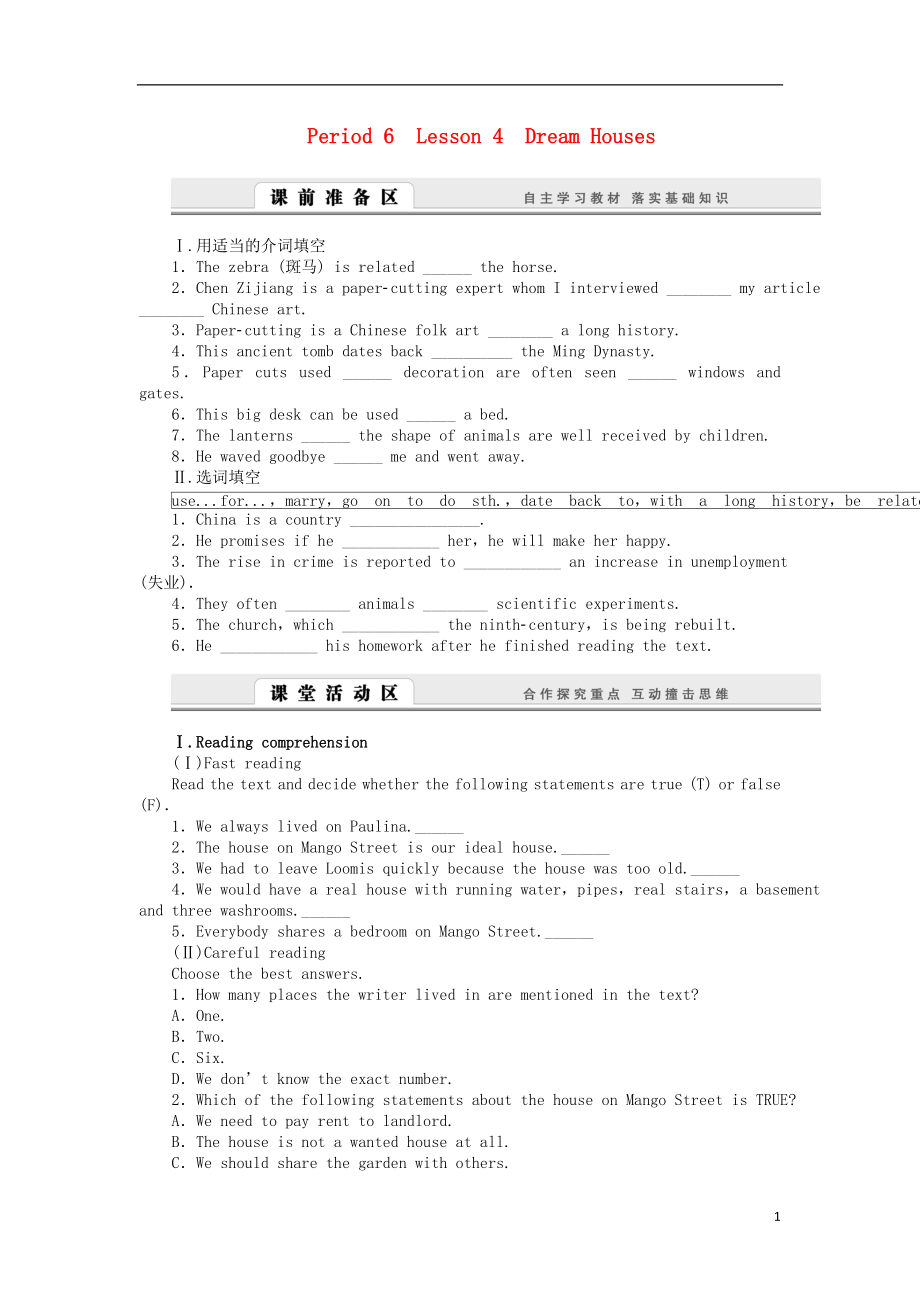《課堂設(shè)計(jì)2015-2016學(xué)年高中英語(yǔ) Unit6 Period6 Lesson 4 Dream Houses學(xué)案 北師大版必修2》由會(huì)員分享�,可在線閱讀���,更多相關(guān)《課堂設(shè)計(jì)2015-2016學(xué)年高中英語(yǔ) Unit6 Period6 Lesson 4 Dream Houses學(xué)案 北師大版必修2(4頁(yè)珍藏版)》請(qǐng)?jiān)谘b配圖網(wǎng)上搜索����。
1、
Period 6 Lesson 4 Dream Houses
Ⅰ.用適當(dāng)?shù)慕樵~填空
1.The zebra (斑馬) is related ______ the horse.
2.Chen Zijiang is a paper-cutting expert whom I interviewed ________ my article ________ Chinese art.
3.Paper-cutting is a Chinese folk art ________ a long history.
4.This ancient tomb dates back _______
2��、___ the Ming Dynasty.
5.Paper cuts used ______ decoration are often seen ______ windows and gates.
6.This big desk can be used ______ a bed.
7.The lanterns ______ the shape of animals are well received by children.
8.He waved goodbye ______ me and went away.
Ⅱ.選詞填空
1.China is a country _____
3����、___________.
2.He promises if he ____________ her,he will make her happy.
3.The rise in crime is reported to ____________ an increase in unemployment (失業(yè)).
4.They often ________ animals ________ scientific experiments.
5.The church,which ____________ the ninth-century����,is being rebuilt.
6.He __
4�、__________ his homework after he finished reading the text.
Ⅰ.Reading comprehension
(Ⅰ)Fast reading
Read the text and decide whether the following statements are true (T) or false (F).
1.We always lived on Paulina.______
2.The house on Mango Street is our ideal house.______
3.We had to leave
5�、 Loomis quickly because the house was too old.______
4.We would have a real house with running water����,pipes,real stairs��,a basement and three washrooms.______
5.Everybody shares a bedroom on Mango Street.______
(Ⅱ)Careful reading
Choose the best answers.
1.How many places the writer lived in are
6�����、mentioned in the text?
A.One.
B.Two.
C.Six.
D.We don’t know the exact number.
2.Which of the following statements about the house on Mango Street is TRUE?
A.We need to pay rent to landlord.
B.The house is not a wanted house at all.
C.We should share the garden with others.
D.We can’t make t
7��、oo much noise there.
3.A landlord is ________.
A.a(chǎn) businessman
B.a(chǎn) piece of land
C.a(chǎn)n owner of a house
D.a(chǎn) cleaner
4.Why did they leave the flat on Loomis?
A.Because the house was too old.
B.Because water pipes broke and nobody would fix them.
C.Because we should share the washroom with oth
8���、ers and carry water by ourselves.
D.All of the above.
5.The passage is mainly about ________.
A.the place where they lived before moving to Mango Street
B.the life on Mango Street
C.a(chǎn) dream house and a real house on Mango Street
D.the reasons why they moved to Mango Street
Ⅱ.Language points
9��、1.The house on Mango Street is ours,and we don’t have to pay rent to anybody,or share the yard with the people downstairs�,or be careful not to make too_much noise���,and worried about the landlord being angry.
芒果街的房子是我們自己的����,不用給任何人交房租����,不用和樓下的住戶共用一個(gè)院子,不用小心翼翼不能大聲喧嘩���,也不用擔(dān)心房東生氣���。
[歸納1]
share vt.分享��,共用��;均分��;n.(該
10、得�,分配或參與)部分�,一份�����;一份責(zé)任
share in 分享�����,分擔(dān)
share sth. with sb.與……合用/分享……
go shares分?jǐn)?��,平?
[運(yùn)用1]
(1)They divide the money into equal ____________.
他們把錢分成相等的份數(shù)。
(2)Can you __________ your experiences ________ us?
你能和我們分享你的經(jīng)歷嗎���?
(3)Let Harry play with your toys as well����,Clare—you must learn to ________.
A
11���、.support B.care
C.spare D.share
[歸納2]
too much太多
[運(yùn)用2]
(4)It’s high time you had your hair cut; it’s getting ________.
A.too much long B.much too long
C.long too much D.too long much
(5)用too much和much too填空
①He talked __________.
②They ate __________ food.
③It’s __________
12�����、__ hot today.
④I am __________ pleased to see you.
2.And we’d have a basement and at_least three washrooms so when we wanted to bathe we wouldn’t have to tell everybody.
房子里還要有個(gè)地下室����,有至少三個(gè)衛(wèi)生間����。這樣我們想洗澡時(shí)就不用通知每個(gè)人。
[歸納]
at least至少
at (the) most至多���,不超過(guò)
not in the least=not at all一點(diǎn)也不
least of all最不應(yīng)該
13�、;尤其不
not the least一點(diǎn)也沒(méi)有
[運(yùn)用]
(1)The house still needed a lot of work���,but ________ the kitchen was finished.
A.instead B.a(chǎn)ltogether
C.a(chǎn)t once D.a(chǎn)t least
(2)—Would you mind if I put the television on?
—No�,________.
A.not in the least B.a(chǎn)t least
C.a(chǎn)t most D.most of all
3.Thi
14�、s was the house Papa talked about when he dreamed of being rich and this was the house Mama dreamed up in the stories she told us before we went to bed.
這是爸爸夢(mèng)想富有時(shí)所談到的房子,也是媽媽在睡覺前給我們講的故事中所夢(mèng)想的房子�。
[歸納]
dream n.夢(mèng),夢(mèng)想�����;v.做夢(mèng)����;夢(mèng)想
dream/have a...dream做了一個(gè)……夢(mèng)
realize one’s dream實(shí)現(xiàn)夢(mèng)想
dream of/about做夢(mèng)���,夢(mèng)見�;夢(mèng)想��,
15���、幻想
dream that...夢(mèng)見……�;想到……
[小貼士]
dream作及物動(dòng)詞時(shí)�,后面常跟同源賓語(yǔ)。常接同源賓語(yǔ)的動(dòng)詞有:smile�����,laugh��,sing,live��,sleep�����,fight����,die等。如:sleep a sound sleep����,fight a battle/fight,die a glorious death����。
[運(yùn)用]
(1)The day he had been dreaming of ________ at last.
A.coming B.comes
C.came D.will come
(2)他夢(mèng)想有朝一日成為小提琴家。(dr
16�����、eam of)
________________________________________________________________________
4.It’s small and red with narrow steps in front and windows so small that you’d think they were holding_their_breath.
房子很小���,是紅色的,前面是窄窄的樓梯,窗子小得讓你覺得它們?cè)谄磷『粑?
[歸納]
hold one’s breath屏住呼吸��,極其緊張�����,提心吊膽
out of breath上氣不接下氣
t
17�����、ake a deep breath深吸一口氣
lose one’s breath喘不過(guò)氣來(lái)
at a breath一口氣地
breathe v.呼吸
breathe in吸入
breathe out呼出
[運(yùn)用]
(1)The girl ________________ at the sight of the snake.
一看到那條蛇��,那個(gè)女孩就(嚇得)屏住了呼吸�。
(2)After climbing the mountain,he was ______.
A.lost his breath B.out of breath
C.held his breath
18��、 D.a(chǎn)t a breath
(3)He ________ before jumping into the water.
A.held his breath B.lost the breath
C.a(chǎn)t a breath D.breathed out
Period 6 Lesson 4 Dream Houses
課前準(zhǔn)備區(qū)
Ⅰ.1.to 2.for�����;on 3.with 4.to 5.for��;on 6.as 7.in 8.to
Ⅱ.1.with a long history 2.marries 3.be related to 4.use��;for 5.d
19���、ates back to 6.went on to do
課堂活動(dòng)區(qū)
Ⅰ.(Ⅰ)1.F 2.F 3.T 4.T 5.F
(Ⅱ)1.D 2.B 3.C 4.D 5.C
Ⅱ.1.(1)shares (2)share�����;with
(3)D [share分享����,符合句意。]
(4)B long是形容詞�����,需用副詞來(lái)修飾�����,much too long中�����,much修飾too, too修飾long�����,故選B項(xiàng)�。
(5)①too much ②too much
③much too?���、躮uch too
解析 ①too much所要表達(dá)的是“much”的意思�����,too修飾much�,可單獨(dú)使用,在句中作狀語(yǔ)����,也
20、可后接不可數(shù)名詞作定語(yǔ)���。
②much too所要表達(dá)的是“too”的意思�,much修飾too����,后接形容詞或副詞。
2.(1)D [instead代替�����,相6反;altogether一起���;at once立刻����,馬上�����;at least至少�����。句意為:這房子還需要做很多工���,不過(guò)廚房至少已經(jīng)完工了����。故選D項(xiàng)�。]
(2)A [句意為:——我打開電視你介意嗎?——不�����,一點(diǎn)也不。只有A項(xiàng)意為“根本不�,一點(diǎn)也不”,等于not at all���,符合句意。]
3.(1)C [句中的he had been dreaming of是定語(yǔ)��,修飾the day�����,句中缺少謂語(yǔ)動(dòng)詞���,需要填謂語(yǔ)動(dòng)詞形式��,又因?yàn)閴?mèng)想已經(jīng)實(shí)現(xiàn)���,故用一般過(guò)去時(shí)。故選項(xiàng)C正確���。]
(2)He dreams of one day becoming a famous violinist.
4.(1)held her breath
(2)B [句意為:爬上山后����,他上氣不接下氣了。因句中動(dòng)詞為be動(dòng)詞�,所以不選A、C兩項(xiàng)���,再根據(jù)意義��,選B項(xiàng)�����。]
(3)A [句意為:在跳入水中之前���,他屏住呼吸。只有A項(xiàng)hold one’s breath有此意�����。]
4
 課堂設(shè)計(jì)2015-2016學(xué)年高中英語(yǔ) Unit6 Period6 Lesson 4 Dream Houses學(xué)案 北師大版必修2
課堂設(shè)計(jì)2015-2016學(xué)年高中英語(yǔ) Unit6 Period6 Lesson 4 Dream Houses學(xué)案 北師大版必修2

